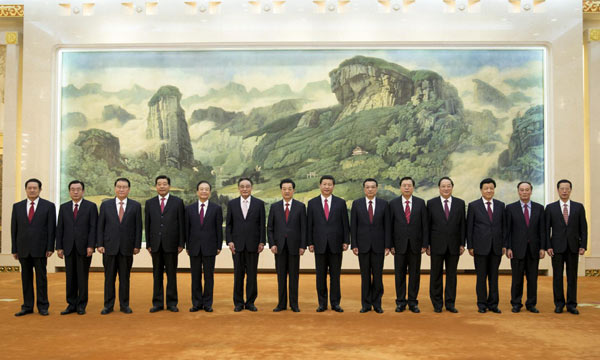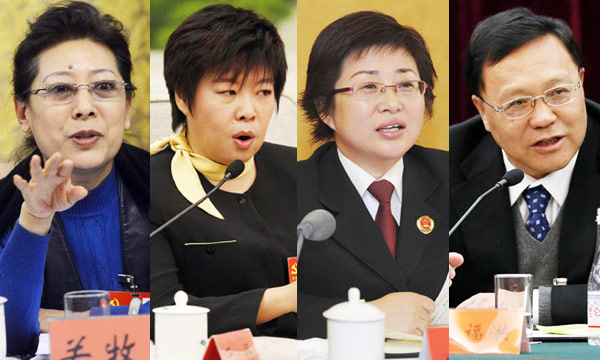'Self development' sustains CPC's rule
(Xinhua)
Updated: 2012-11-01 20:02
BEIJING - Pan Guozhi was a bit surprised when several officials with the city's human resources and social security bureau visited him at his compact fluorescent lamp firm in Hefei, capital of East China's Anhui province.
He runs it with several classmates that he graduated from college with in 2011.
| ||||
Soon after the visit, Pan's firm received a discount loan of 300,000 yuan ($48,000) from the government. The business moved into a local industrial park which offered lower rent for young entrepreneurs.
Pan had benefited from employment promotion policies launched by Hefei's human resources and social security bureau this year. This was enabled after a meeting of the Communist Party of China (CPC) Central Committee Political Bureau, the country's leadership body, in Beijing.
Members of the political bureau meet every few months for a group study. One or two leading experts in certain fields will give lectures to senior leaders.
On February 21, the lecture was about pro-active employment policies. Chinese President Hu Jintao was among the audience and gave a speech after the lecture.
Shortly after the group study in Beijing, Wang Shibao, deputy head of Hefei's human resources and social security bureau, attended a group study on the same topic organized by the bureau's party committee.
At the group study, Wang and his colleagues discussed the content of the lecture and Hu's speech.
Hu spoke of the need to create jobs and provide more assistance for small firms and to help young people start their own businesses.
"Some ideas in the President's speech were inspiring so we had a heated discussion," Wang recalled.
In a bid to improve employment, Hefei government used to provide unemployed people with training programs and help them find jobs. Inspired by Hu's speech, they decided to offer more support to people who wanted to start a business and for small and medium-sized firms so that they may hire more employees.
Pan and his firm fell into this category.
"The officials also asked my advice on how to improve their work. I was very impressed by their active and positive attitude," Pan said.?
Live and learn
A group study is only part of out-of-hours training programs Wang will have as a medium-level local official and CPC member. From January 2011 to this June, he attended 14 lectures on various topics from social management to Internet communication.
He also has to attend full-time programs in local Party schools.
"Training programs, lectures and study meetings help me keep in touch with the times, the world outside my everyday work. It is like recharging my batteries that in return benefits my work," Wang said.
Self development is a requirement the CPC imposes on its members, especially those holding important positions.
Since 2002, the 20-member-odd CPC Central Committee Political Bureau have had 77 group studies on major issues in the country's political, economic and social sectors, including grass-roots democracy, medical reform and global economy.
The Party School of the CPC Central Committee, which trains high-level officials, holds 45 programs and enrolls more than 3,000 people annually. Those giving lectures in the school include foreign state leaders, leading scholars and executives of multinationals.
The quality of the Party's governance is rooted in every official. The CPC has placed great importance on education and training of its members and asked chief officials to spend more time on learning, said Li Junru, former vice president of the Party School of the CPC Central Committee.
"This can also be considered as an effort to encourage morality and curb malpractice and corruption, which now is a life-or-death issue for the CPC's rule," Li said.
The CPC also highlights "self development" of the Party.
Xi Jinping, Vice-President and president of the Party School of the CPC Central Committee, said in a speech at the school that borrowing good ideas and learning from others is one of the reasons why the CPC has maintained vitality and kept making progress in its 91-year history.
"If the CPC had not developed and adjusted itself to the changing reality, there would not have been the People's Republic of China, the reform and opening-up, the socialism with Chinese characteristics and all achievements China has today," said Jia Jianfang, a professor with the Party School of the CPC Central Committee.
The CPC will hold its 18th national congress next week. People are expecting the Party and its new leadership to adjust to complicated situations and tough challenges in today's China.
Related Stories
Xi tells attendees at Party school to focus on study 2012-09-03 08:11
A lesson in sharing experiences 2012-06-26 04:24
Party school course for Zhongguancun entrepreneurs 2012-04-10 09:11
Book examines how CPC works 2011-10-14 08:17
Party school values training with global vision 2011-06-21 20:15

Top News
Xi emphasizes adherence to CPC Congress spirit
Top legislator urges implementation of congress spirit
Moderately prosperous China brings chances to world
Video










